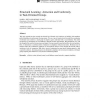183 search results - page 8 / 37 » Learning Social Preferences in Games |
100
click to vote
CMOT
1999
15 years 1 months ago
1999
This study extends previous research that showed how informal social sanctions can backfire when members prefer friendship over enforcement of group norms. We use a type of neural...
155
click to vote
GECCO
2010
Springer
15 years 2 months ago
2010
Springer
This paper takes an economic approach to derive an evolutionary learning model based entirely on the endogenous employment of genetic operators in the service of self-interested a...
103
click to vote
CSCW
2008
ACM
15 years 3 months ago
2008
ACM
The design of online collaborative computer games and pervasive games can learn from the everyday practice of deer hunting. We present an ethnographic study revealing how hunters ...
125
click to vote
CORR
2002
Springer
15 years 1 months ago
2002
Springer
The aggregation of conflicting preferences is a central problem in multiagent systems. The key difficulty is that the agents may report their preferences insincerely. Mechanism de...
122
click to vote
AAAI
2011
14 years 1 months ago
2011
Automated agents for electricity markets, social networks, and other distributed networks must repeatedly interact with other intelligent agents, often without observing associate...

